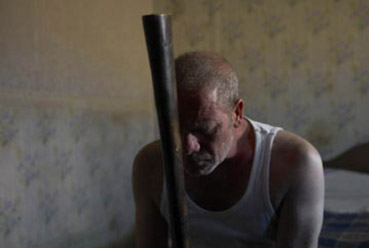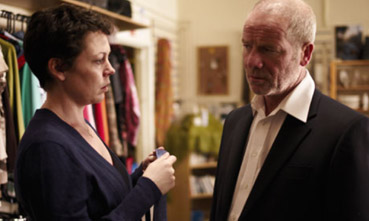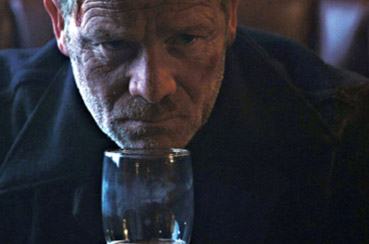|
Tyrannosaur is a film of uncommon ferocity, a barely relenting tragedy that, thanks to its powerful performances, is also deeply moving. The film has deservedly picked up both acting and directing accolades at Sundance earlier this year, but the subject matter's unremitting bleakness will severely limit it's chances of finding a wide audience at the multiplex this weekend. Extending his BAFTA-winning short Dog Altogether, Paddy Considine's feature debut arrives on our cinema screens with Altogether's vulgar power undiluted. As evidenced by their collaboration on the short, Considine has found an angry bastard soul mate in Scottish powerhouse Mullan, two actors whose resumes are populated by vagrants thrashing in and against society's gutter and expressing themselves through unconscionable acts of violence. In transition from short to feature, the duo has created something of a monster. If Dog Altogether was a lethal off-the leash pit-bull, it's fitting that the opening moments of its full-length expansion revisit the now famously controversial scene of failing-to-reform-himself-drunk Joseph (Mullan) kicking his own pet dog to death in a snap of rage. This time there's an even greater heightened intensity, revealing Tyrannosaur as a beast altogether more terrifying than its predecessor.
Right from the off there's a glimpse of Considine's considerable artistry blazing in the violence. Understanding the obvious—that kicking your own pet dog to death is repellent enough—Considine chooses not to partake in this unwarranted outburst with the usual shop-worn relish of shakey cam, sickeningly 'putting us right in the action.' Instead he lets us see inside the head of the perpetrator, rapidly inter-cutting berserker kicks with tortured close-ups of Joseph steadily beating his head against a baseball bat; anger boiling over with no outlet. Like a human Newton's Cradle, the scene has a mesmeric effect, and though the dog-stomping itself is an act of indelible sadism you can't make yourself un-see till long afterwards, these visual refractions of equal and opposite reactions rooted in individual suffering allow us to consider the savage beating's troubling sadomasochistic implications.

Knocking the wind right out from us, Considine throws this scene down like a gauntlet to the rest of the film, and is wholly uncompromising in keeping his audience pinned against the ropes for the duration. Domestic brutality, child abuse, guilt, grief and Godlessness predominate, though it's only until the third act that he accentuates any of this for dramatic effect with the fear-mongering subtlety of an NSPCC ad. For the most part, violence is just the norm of the world Joseph inhabits. By the time he's launched himself at two homophobic youths in a pub and chased out a third, it's not that we become desensitized to his random attacks, but rather they've settled into a continuous, mid-tempo groove, in which we begin to sense them before they erupt. Forever stuck in an embattled state of mind, it's easy to sympathise with Joseph's alcoholism as the only means of dulling the prism of red he views the world through.
Lining up all the grim elements that constitute Joseph's psychosis, it would be all too easy to place this alongside the swelling ranks of miserablist, home-grown fare that so often makes up the other half of British drama—the kind that doesn't come wearing a period bonnet. From Nil by Mouth to more recent entries in the 'things as they really are' canon, such as Harry Brown and Eden Lake, the espousal of ever-more depressing levels of violence, excused in the name of supposed authenticity, carries a fatigue of familiarity. Not considering themselves among the glut of filmmakers looking to hold up gritty, social-realist portraits we go out of our way to ignore in everyday life, Considine and Mullan balk at this 'social realist' label often slapped on their directorial output. Mullan goes so far as to compare people who create drama and sell it as reality as no better than those who pedal the merits of reality TV: "Cunts who run around saying 'I'm just holding a camera up to people as I believe they are."* Tyrannosaur does not exist solely for provocation and forcing us to look in the mirror. It's not a film about 'issues', but people going the wrong way about solving them.
Mullan rightly disassociates this film from a certain brand of kitchen sink drama, but is reaching by aligning it with the impressionist fables of Lynne Ramsey, whose films are sensual where this is guarded; drenched in colour where this is drained; predominately red and urgent where this is grey and tired. As a fable, Tyrannosaur most definitely succeeds in anthropomorphising a force of nature—a succinct summary of Mullan's performance here, whose frame perennially trembles trying to contain the forces within—but by definition, a fable usually reaches for a pithy maxim or moral point of destination. There's no salvation in the form of finger-wagging moralism here, though an observation in his review of this month's Sight & Sound magazine reveals Trevor Johnston as looking for lessons learned where perhaps there are none. He posits that the winter-bare trees outside Joseph's council house (which loom large on the film's instantly iconic poster) are a symbol of endurance and renewal. I myself see no such rejuvenation or redemption. In the five years since his wife passed, Joseph is simply a man forced to walk the scorched earth of his own making. In his world there are no seasons, and the trees always look that way.

Helping him navigate this terrain is battered wife Hannah (Olivia Coleman), a Christian charity shop worker who reaches out to Joseph, in spite of his damning dismissal of her beliefs, and the constant torrent of verbal abuse when he seeks refuge inside her shop. During their first meeting, Joseph talks to Hannah while concealed behind racks of clothes; hiding in exile, as if the very streets from which he is carved have renounced him now too, a final rejection from the outside world. Undeterred, Hannah turns the other cheek, determined to quell his fury and help Joseph see the better man buried deep inside, someone she can no longer see in her own husband James (Eddie Marsden), who routinely beats and rapes her. Coleman strips Hannah bare for all to see, right down to the pitilessness she herself can't yet admit. The actresses' choice of making her fragility so transparent is one which exposes the futile ulterior motive behind her mercy mission as an act of transference; sheer obstinacy on her part in trying to achieve what she has been unable to do so on the home front.
Hannah knows what a huge mistake she made marrying James, and that it's too late to turn it around at this point, but if she can positively effect the life of someone as despairing as she is, there's at least a chance of restoring her desperately flagging faith. You might wonder why she doesn't just divorce the scumbag and be done with it, but such is the power of denial, a force as potently manifest in Joseph's physical aggression. You could ask why, but these two characters are lost souls so far gone they wouldn't understand the question. In Hannah's case, this is the one thing that scares her more than her husband; acknowledging what a mess she's made of her life. We don't need to be told—the backstory and motivation is all there, painfully plain on her face. By the same token, Joseph's own countenance is a seething junction of hard-worn lines that eliminate any necessity for backstory altogether. You don't need to know why he hurts, because you feel it so immensely.

Hannah may have her own reasons for reaching out to Joseph, but the simple act of being in her prayers proves to be a lifeline for a man blinded by his own anger. He may not need God, but he does need someone. At home he talks to himself agitatedly; the back and forth of the embittered angel on his shoulder failing to prevail against the devil in his heart. As his relationship with Hannah becomes less volatile, a lamp-lit night walk together shows Joseph's progression toward kindness, but in a film shot through with cruel irony, even as Joseph turns his back on violence it's forever right outside his door and he just so happens to turn away when his physical brute force is needed most. These achingly incremental shifts in character and raging inner conflicts are all expressed wordlessly, regretfully conveying how none of us can ever get far enough outside the shadow of what comes most naturally to us. The pair of central performances go a long way in informing a general 'show-don't-tell' minimalism, animal enough (at least in the screenplay) to never plumb for false notes of salvation or strive too hard for pathos. A horribly misconceived montage sequence of the two of them bonding at a local pub during a funeral reception is a grindingly incongruous betrayal of tone. The sham of sentimental guitar twangs that play over the sequence confirm Considine's one and only major misstep, but thankfully, just when you think you're smelling a shoehorned whiff of uplift, the screenplay curtly shoots it down. Now tentative friends and invited into Joseph's home, Hannah declares, "I feel safe with you." Joseph definitely retorts: "Nobody's safe with me." The evidence of his home life suggests he's right. The only picture he has of his deceased wife is of her holding a can of booze and now that he's drinking for two, he's surely not far behind. Confiding in Hannah about the state of his own marital oppression is one of Joseph's few sober moments of reflection—rather than making him a repentant saint in waiting, the script is unafraid of pointing out the easily-riled belligerent he's always been, clear-headed or drunk. "Did you love her?" Hannah disquietingly enquires. "Uh-huh. And I hated her just as much." He goes on to recount the origin of an unforgettably mean-spirited nickname for his late wife, an allusion to Steven Spielberg's Jurassic Park from which the film's title is also inspired. Yet we never loathe Joseph because he is all too aware of himself, resigned to how karma has come back to bite him in the ass. He knows he is dumb and naïve, only appreciating the beauty of his wife and her stoic attitude in death. Even though he obviously misses her and needs her companionship, Joseph doesn't want her back, because he knows what is clear to us from the opening scenes: he'd still treat her like a dog altogether.
As a dark night of the soul, Tyrannosaur is an undiluted, unvarnished slab of primal, concrete rage, made extraordinary and compulsively watchable by actors who know these characters well and have deep empathy for them. After portraying them twice now, they're able to make so much more out of the crucibles of misery these parts could have so easily become in less accomplished hands, turning them into painfully real people more or less as they appear on screen.
* Sight & Sound, November 2011, p.41
|